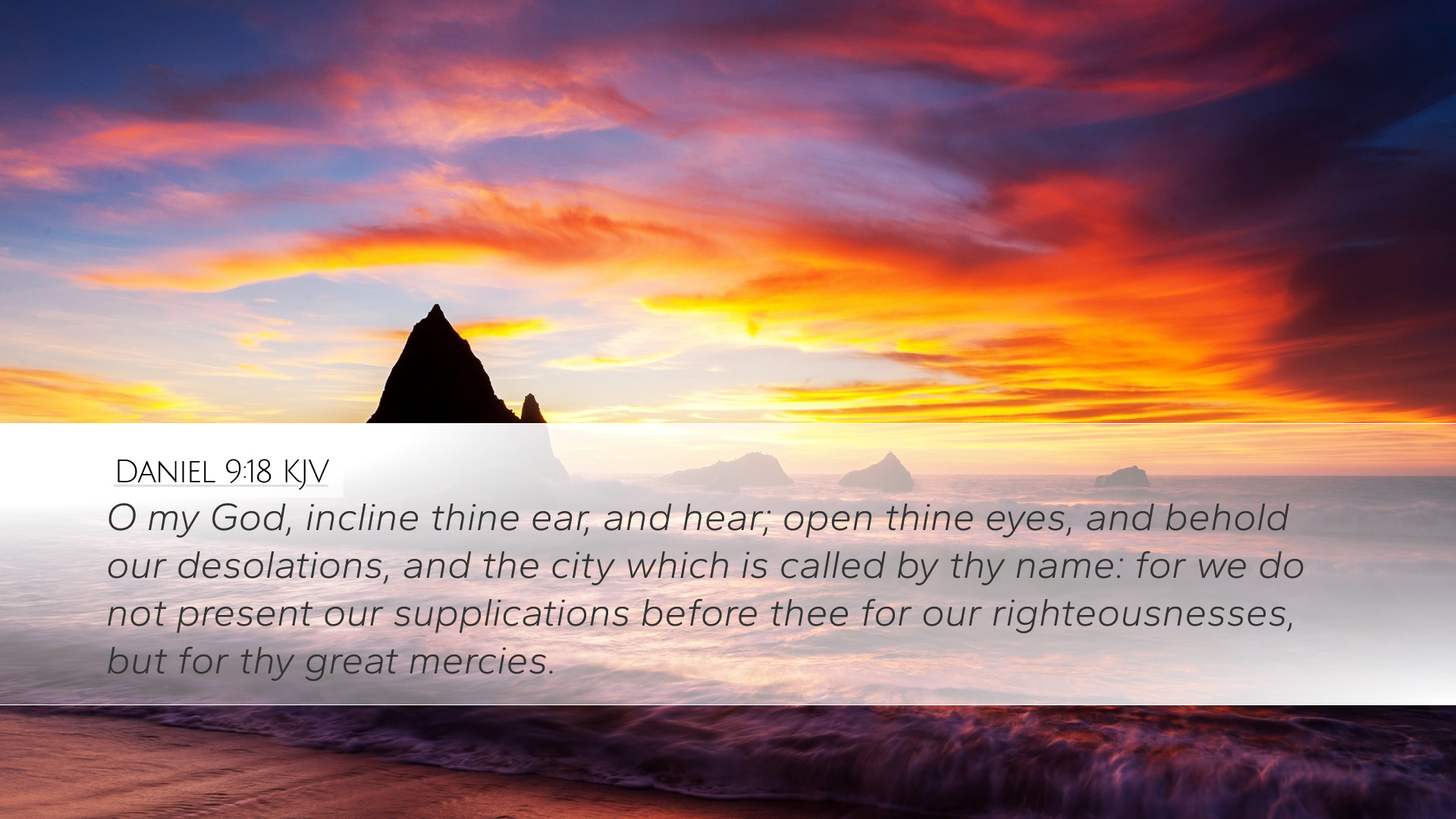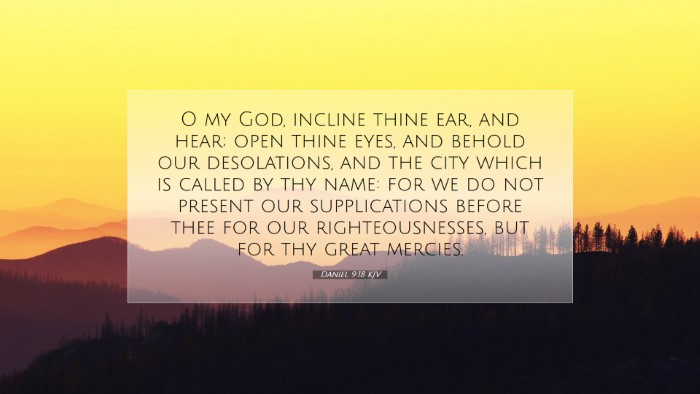Commentary on Daniel 9:18
Verse Text: "O my God, incline your ear and hear; open your eyes and see our desolations, and the city that is called by your name. For we do not present our pleas before you because of our righteousness, but because of your great mercy."
Introduction
Daniel 9:18 serves as a poignant expression of humility and supplication from the prophet Daniel as he seeks God's intervention for his people. In this verse, Daniel acknowledges both the dire circumstances of Israel and the richness of God's mercy. This commentary synthesizes insights from various public domain commentators to provide a multifaceted view of this powerful petition.
Overall Context
The ninth chapter of Daniel contains one of the most significant prayers in the Bible, which stems from the prophet's contemplation of the seventy years prophesied for the desolation of Jerusalem. Daniel's prayer is not merely an expression of personal yearning but one that encapsulates the collective plight of the Jewish people, acknowledging their sins and seeking restoration.
Historical Background
After Babylonian exile, the Jewish people faced immense challenges, and Daniel's prayer reflects the burdens of their collective sin. This context is critical to understanding the urgency of his plea for divine attention and mercy. The exiles had been through significant hardships and longed for their city (Jerusalem) to be restored.
Key Themes
- Desperation and Plea for Attention:
Daniel’s cry to “incline your ear” and “open your eyes” captures a profound sense of desperation. The terms imply a need for God to be attentive and responsive to their plight.
Matthew Henry emphasizes that such a plea indicates a sincere acknowledgment of their desperate condition and a recognition of God's sovereign ability to act.
- Acknowledgment of Desolations:
The “desolations” refer to the devastated state of Jerusalem and its people. Albert Barnes notes that acknowledging their plight is critical for repentance and restoration, highlighting that they recognize the consequences of their sins.
- The Significance of God’s Name:
Daniel speaks of "the city that is called by your name," indicating the distinction of Jerusalem as a place where God's presence dwelled. Adam Clarke explains how invoking God’s name invokes His attributes, setting a basis for his petition.
It also reflects the relationship dynamics between God and His people, showing that the city’s welfare is fundamentally tied to the divine identity.
- The Basis of Petition:
Importantly, Daniel states that his pleas are not based on their righteousness but on God's mercy. Matthew Henry comments that this recognition is fundamental to sincere prayer, as it points to the core of human fallibility and need for divine grace.
Albert Barnes further notes that this self-awareness about their unworthiness magnifies the grace of God, who chooses to listen and respond to prayers despite human failures.
Application for Today
For pastors, students, and theologians, Daniel 9:18 serves as an essential reminder of the nature of prayer and the humility required to approach God. This passage teaches that acknowledging one’s neediness before God is a pathway to experiencing His mercy.
It implores believers today to reflect on the collective state of their communities and the world, recognizing that sincere beseeching for mercy may resonate deeply with God’s character.
Lessons for the Church
-
Importance of Confession:
Just as Daniel confessed the sins of Israel, contemporary believers are called to speak honestly about their shortcomings and those of the wider church as a communal body before God.
-
Health of Relationships:
The understanding that God’s glory and mercy are intertwined with the church's witness emphasizes the need for the church to live righteously and uphold God's name in every action.
This requires a communal effort of prayer and accountability.
-
Divine Intervention Required:
Today, Christians are reminded that they must rely not on their strength or righteousness but on the mercy of God in all of life’s challenges. This nature of divine mercy should encourage continuous prayer and dependence on God.
Conclusion
In summary, Daniel 9:18 encompasses a deep theological understanding of sin, mercy, and God's character. This passage invites readers to identify with Daniel’s profound humility and earnestness in seeking God. Reflecting on the lessons from this verse encourages an ongoing pursuit of reconciliation with God that is rooted in humility and the persistent hope in His inexhaustible mercy.


